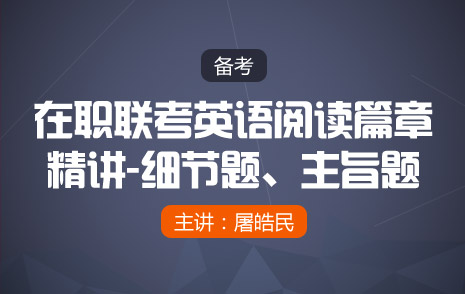2014-09-16 07:06:00 来源:网络发表评论
 在职联考准考证打印
在职联考准考证打印
备考辅导:英语备考策略和技巧 联考英语翻译备考策略 2015在职硕士考试经验技巧
GCT考试: GCT英语备考辅导 GCT数学备考辅导 GCT语文备考辅导 GCT逻辑备考
公共管理: 公文写作范文汇总 2015年在职MPA管理学案例材料 人力资源营销新论
艺术硕士: 艺术硕士艺术概论资料汇总 艺术硕士复习试题|答案 艺术硕士备考知识点
In recent years, railroads have been combining with each other, mergingintosuper systems, causing heightened concerns about monopoly. As recently as 1995, the top four railroads accounted for under 70 percent of the total ton-miles moved by rails. Next year, after a series of mergers is completed, just four railroads will control well over 90 percent of all the freight moved by major rail carriers.
Supporters of the new super systems argue that these mergers will allow for substantial
cost reductions and better coordinated service. Any threat of monopoly, they argue, is removed by fierce competition from trucks. But many shippers complain that for heavy bulk commodities traveling long distances, such as coal, chemicals, and grain, trucking is too costly and the railroads therefore have them by the throat.
The vast consolidation within the rail industry means that most shippers are served by only one rail company. Railroads typically charge such "captive" shippers 20 to 30 percent more than they do when another railroad is competing for the business. Shippers who feel they are being overcharged have the right to appeal to the federal government's Surface Transportation Board for rate relief, but the process is expensive, time consuming, and will work only in truly extreme cases.
Railroads justify rate discrimination against captive shippers on the grounds that in the long run it reduces everyone's cost. If railroads charged all customers the same average rate, they argue, shippers who have the option of switching to trucks or other forms of transportation would do so, leaving remaining customers to shoulder the cost of keeping up the line. It's theory to which many economists subscribe, but in practice it often leaves railroads in the position of determining which companies will flourish and which will fail. "Do we really want railroads to be the arbiters of who wins and who loses in the marketplace?" asks Martin Bercovici, a Washington lawyer who frequently represents shipper.
Many captive shippers also worry they will soon be his with a round of huge rate increases. The railroad industry as a whole, despite its brightening fortuning fortunes, still does not earn enough to cover the cost of the capital it must invest to keep up with its surging traffic. Yet railroads continue to borrow billions to acquire one another, with Wall Street cheering them on. Consider the 2 billion bid by Norfolk Southern and CSX to acquire Conrail this year. Conrail's net railway operating income in 1996 was just million, less than half of the carrying costs of the transaction. Who's going to pay for the rest of the bill? Many captive shippers fear that they will, as Norfolk Southern and CSX increase their grip on the market.
1. According to those who support mergers railway monopoly is unlikely because .
A. cost reduction is based on competition
B. services call for cross-trade coordination
C. outside competitors will continue to exist
D. shippers will have the railway by the throat
2、What is many captive shippers' attitude towards the consolidation in the rail industry?
A. A.Indifferent.
B. Supportive.
C. Indignant.
D. Apprehensive.
3、It can be inferred from paragraph 3 that .
A. shippers will be charged less without a rival railroad
B. there will soon be only one railroad company nationwide
C. overcharged shippers are unlikely to appeal for rate relief
D. a government board ensures fair play in railway business
4. The word "arbiters" (line 6, paragraph 4)most probably refers to those .
A. who work as coordinators
B. who function as judges
C. who supervise transactions
D. who determine the price
5. According to the text, the cost increase in the rail industry is mainly caused by .
A. the continuing acquisition
B. the growing traffic
C. the cheering Wall Street
D. the shrinking market
参考答案:CDCBA
 已帮助8878人
已帮助8878人
| GCT | 【特训】2015年GCT英语全程专项特训班 | ¥980 | 免费试听 |
| 【特训】2015GCT语文全程专项特训班 | ¥400 | 免费试听 | |
| 【特训】2015年GCT数学全程专项特训班 | ¥680 | 免费试听 | |
| 【特训】2015年GCT逻辑全程专项特训班 | ¥400 | 免费试听 | |
| 联考英语 | 【提高】2015年联考英语技巧提高班 | ¥680 | 免费试听 |
| 【冲刺】2015年联考英语冲刺抢分班 | ¥680 | 免费试听 | |
| 法律硕士 | 【全程】2015法律硕士专业综合全程 | ¥880 | 免费试听 |
| 工商管理 | 写作专项零基础班数学专项逻辑专项 | ||
| 专项班 | 公共管理会计硕士教育硕士艺术硕士 | ||
版权及免责声明
1,"新东方在线"上的内容,包括文章、资料、资讯等, 本网注明"稿件来源:新东方在线"的,其版权 均为"新东方在线"或北京新东方迅程网络科技有限公司所有 ,任何公司、媒体、网站或个人未经授权不得转载、链接、转贴或以其他方式使用。已经得到 "新东方在线"许可 的媒体、网站,在使用时必须注明"稿件来源:新东方",违者本网站将依法追究责任。
2, "新东方在线" 未注明"稿件来源:新东方"的 文章、资料、资讯等 均为转载稿,本网站转载出于传递更多信息之目的,并不意味着赞同其观点或证实其内容的真实性。如其他媒体、网站或个人从本网站下载使用,必须保留本网站注明的"稿件来源",并自负版权等法律责任。如擅自篡改为 " 稿件来源:新东方 " ,本网站将依法追究其法律责任。
3,如本网转载稿涉及版权等问题,请作者见稿后在两周内与新东方在线联系。

 w
12分56秒
w
12分56秒